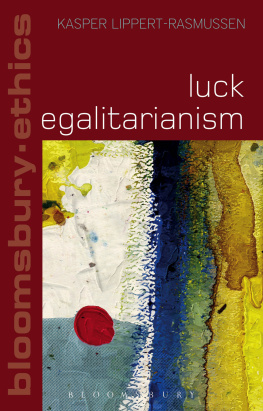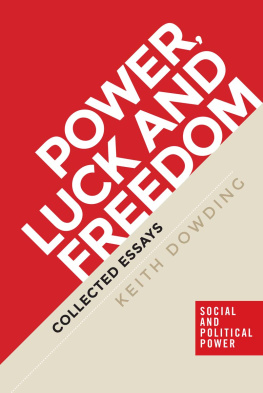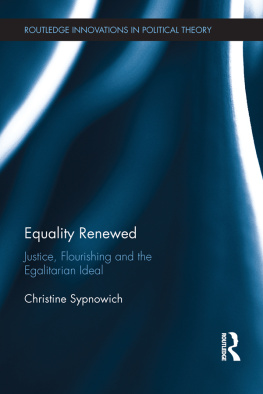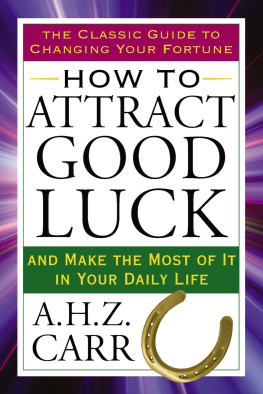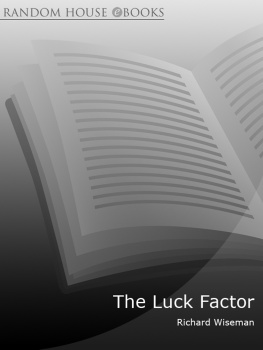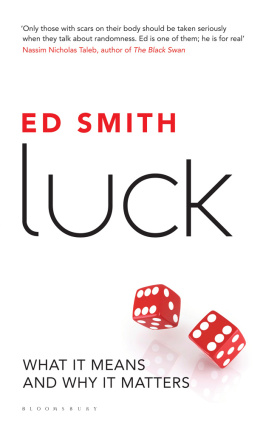Luck Egalitarianism
BLOOMSBURY ETHICS
Series Editors
Thom Brooks, Reader in Law, Durham Law School, UK and
Simon Kirchin, Philosophy, University of Kent, UK
Bloomsbury Ethics is a series of books on established and new
areas in moral philosophy. Each book is designed both to introduce
upper level undergraduates and postgraduates to a key field in
ethics, and to develop a particular viewpoint within that field
designed to appeal to researchers. All areas of moral philosophy are
covered, from the theoretical to the practical. New proposals are
always welcome. Please contact the series editors.
Titles available in the series
Intuitionism, David Kaspar
Reasons, Eric Wiland
Autonomy, Andrew Sneddon
Ethics without Intention, Ezio Di Nucci
Moral Motivation, Leonard Kahn
Moral Realism, Kevin DeLapp
Trust, Ethics and Human Reason, Olli Lagerspetz
Virtue Ethics, Nafsika Athanassoulis
Moral Principles, Maike Albertzart
Forthcoming
Moral Skepticism, Basil Smith
I dedicate this book to Ccilie, Hannah, Kira, Samuel and William in greater love and commitment than might appear in troubled times.
Luck
Egalitarianism
Kasper
Lippert-Rasmussen
Bloomsbury Academic
An imprint of Bloomsbury Publishing Plc
Contents
e
Generations
A previous version of at the Political Theory Section, Department of Politics, University of Aarhus, 11 November 2014. I thank Sren Flinch Midtgaard, Vronique Munoz Darde, Morten Dige, Lasse Nielsen, Orsolya Reich, Mark Reiff, Raffaele Rodogno, Asbjrn Steglich-Petersen and Jens Damgaard Thaysen for helpful comments. I am extremely grateful to Andreas Albertsen, David Vestergaard Axelsen, Martin Marchman Andersen and Shlomi Segall for written comments on most of a previous draft of the entire book. Finally, I thank the participants at a Chaire Hoover workshop May 2627 2015 for stimulating discussion and helpful criticisms of the book.
I thank the relevant journals and publishers for permission to reuse material from the following of my publications:
Review of Kok-Chor Tan: Justice, Institutions, and Luck: The Site, Ground, and Scope of Equality , Mind , 123 (490) (2014): 6536.
Justice and Bad Luck, Stanford Encyclopedia . Available online: http://plato.stanford.edu/entries/justicebad-luck/ (accessed 11th April 2014).
Democratic Egalitarianism vs. Luck Egalitarianism: What Is At Stake?, Philosophical Topics , 40 (1) (2012b): 11734.
Offensive Preferences, Snobbish Tastes, and Egalitarian Justice, Journal of Social Philosophy , 44 (4) (2014): 43958.
Equality of What? and Intergenerational Justice, Ethical Perspectives , 19 (3) (2012): 50126.
Telic versus Deontic Egalitarianism, in N. Holtug and K. Lippert-Rasmussen (eds), Egalitarianism: New Essays on the Nature and Value of Equality , Oxford: Oxford University Press, 2006, 10124.
T his book expounds luck egalitarianism in some detail. Roughly, and at a very abstract level, the view holds that it is unjust for some to be worse off than others through bad luck. However, to the extent that they are worse off than others but not through bad luck their disadvantaged position might not be unjust.
These simple thoughts have occupied the centre stage in many discussions in political philosophy/theory generally, and in academic discussions about distributive justice specifically, since the American philosopher and legal theorist Ronald Dworkins two seminal articles both entitled Equality of What? appeared in Philosophy & Public Affairs in 1981. On one influential interpretation, Dworkins main aim there was to argue that, setting aside differences in exercise of responsibility and various special circumstances, people should be equal in terms of resources, not in terms of welfare. Moreover, in these two articles Dworkin showed how egalitarianism could incorporate within it the most powerful idea in the arsenal of the anti-egalitarian Right: the idea of choice of responsibility (Cohen 2011: 32). This has served as inspiration for a large number of theorists since then.
While Dworkins articles sparked an unprecedented interest in luck egalitarianism itself (e.g. Arneson 1989, 1999; Cohen 2011; Nagel 1991; Rakowski 1991; Roemer 1993, 2000; Temkin 1993; Vallentyne 2002; van Parijs 1991, 1995) as well as in applying it to various practical issues such as health care, climate change and cultural minority rights (e.g. Segall 2009; Norheim and Cappellen 2005; Lippert-Rasmussen 2014b, 2012a, 2009; Kymlicka 1991), the view has important roots in Rawlsian ideas about social and natural lotteries.
In speaking, as outcomes of the so-called social and natural lotteries, respectively. One is neither responsible for, nor deserves, ones starting point in life. Moreover, Rawls thought that some societies, e.g. ones in which mere formal equality of opportunity prevails in that all have at least the same legal rights to all advantaged social positions (Rawls 1971: 72), but in which no steps are taken to eliminate difference resulting from differential outcomes in the social and natural lotteries, are unjust. They are unjust because they permit distributive shares to be improperly influenced by the outcomes of these lotteries (Rawls 1971: 72). Further back in the history of philosophy, there are affinities between luck egalitarians insistence that justice is unconditioned by luck and Kants rejection of the idea that morality is conditioned by luck (Kant 2002).
While luck egalitarianism remains a very influential theory of distributive justice, in recent years an egalitarian contestant has appeared and steadily grown stronger. Presently, many egalitarians reject luck egalitarianism in favour of social relations egalitarianism. Like luck egalitarianism, it sees itself as egalitarian, but, unlike luck egalitarianism, it has no objections to differential luck as such. Rather, it claims that justice requires that citizens be able to relate to one another as equals. One core claim of this book is that not only is the ideal of equality of social relations still to be stated perspicuously, but most of the concerns social relations egalitarians accuse luck egalitarians of being blind to can be accommodated within luck egalitarianism. In any case, one might think that justice is concerned with luck as well as with equal social standing. Indeed, having a lesser social standing through bad luck can be seen as an injustice by luck egalitarians.
This book does not offer a comprehensive treatment of luck egalitarianism, but it covers the main issues raised by the view. It is written as an advanced introduction to its topic, which is accessible to third-year BA students. (That is why, in the interest of accessibility, this book contains no footnotes or endnotes!) However, it also contains a number of novel ideas and claims. For instance, I provide an account of the presumption in favour of equality that connects with a particular and novel answer to the Equality of what? question.
Ronald Dworkin, G. A. Cohen and Richard Arneson and, using this presentation as a springboard, introduces some of the main issues that I return to in later chapters. In the closing section, the chapter contrasts luck egalitarianism with other distributive principles, e.g. utilitarianism, prioritarianism, sufficientarianism and Rawls difference principle.
explores the equality component in luck egalitarianism. By this I mean the commitment of luck egalitarians to an equal distribution as opposed to one that, say, maximizes moral value or leaves everyone with enough in the absence of non-luck-based justifications of deviations from equality. I argue that this presumption of equality among persons with an equal moral standing is justified by the fact that people have the same capacity to care non-instrumentally about things in a way that is distinctive of persons, e.g. in a way that involves a plan of life or at least planning over extended periods of time.

